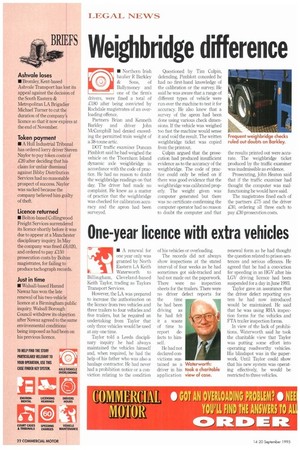Weighbridge difference
Page 24

If you've noticed an error in this article please click here to report it so we can fix it.
• Northern Irish haulier R Barkley & Sons, of Ballymoney and one of the firm's drivers, were fined a total of £180 after being convicted by Rochdale magistrates of an overloading offence.
Partners Brian and Kenneth Barkley and driver John McCamphill had denied exceeding the permitted train weight of a 38-tonne artic.
DOT traffic examiner Duncan Pimbloft said he had weighed the vehicle on the Thornham Island dynamic axle weighbridge in accordance with the code of practice. He had no reason to doubt the weighbridge readings on that day. The driver had made no complaint. He knew as a matter of practice that the weighbridge was checked for calibration accuracy and the apron had been surveyed. Questioned by Tim Culpin, defending, Pimblott conceded he had no first-hand knowledge of the calibration or the survey. He said he was aware that a range of different types of vehicle were run over the machine to test it for accuracy. He also knew that a survey of the apron had been done using various check dimensions. If the vehicle was weighed too fast the machine would sense it and void the result. The written weighbridge ticket was copied from the printout.
Cu1pin argued that the prosecution had produced insufficient evidence as to the accuracy of the weighbridge. The code of practice could only be relied on if there was good evidence that the weighbridge was calibrated properly. The weight given was computer generated but there was no certificate confirming the computer operator had no reason to doubt the computer and that the results printed out were accurate. The weighbridge ticket produced by the traffic examiner was inadmissible as evidence.
Prosecuting, John Heaton said that if the traffic examiner had thought the computer was malfunctioning he would have said.
The magistrates fined each of the partners £75 and the driver £30, ordering all three each to pay £30 prosecution costs.
















































































































